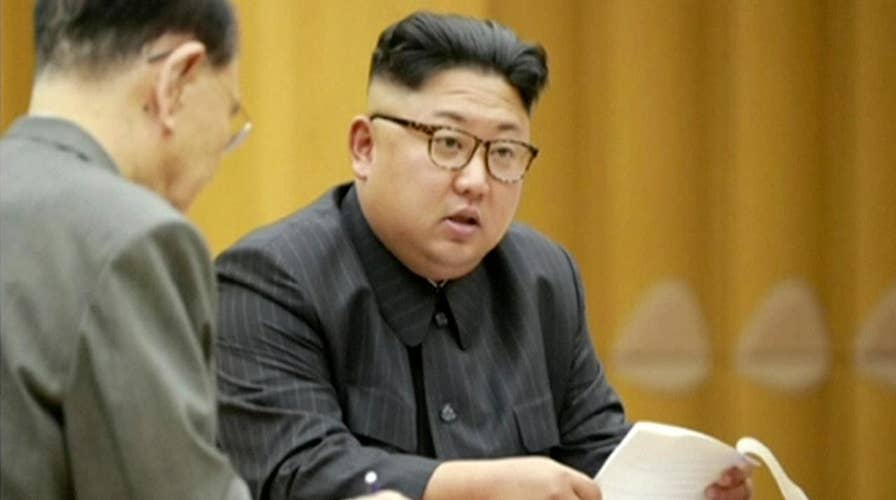US drafting new sanctions to isolate North Korea
Rich Edson reports on the State Department's reaction North Korea's claim of a nuclear test
The United States aims to impose the strictest sanctions ever on North Korea, with a vote on a U.N. resolution set to take place Monday amid mounting tensions between the two countries.
The move is said to be unlike previous U.S. efforts, in which the U.S. has spent weeks, and sometimes months, carefully crafting language with China before presenting the resolution to the rest of the Security Council for a vote.
The new push could potentially cause a rift with China, North Korea’s ally and trading partner, as well as with Russia.
The speedy U.S. action is prompted by Washington’s concern over what North Korea leadership claims was a hydrogen bomb test last weekend, as well as its recent missile launch over Japan, several diplomats said.
Britain's U.N. Ambassador Matthew Rycroft stressed that “maximum possible pressure” must be placed on North Korea to give diplomacy a shot at ending the ongoing crisis.
Rycroft said a proposed ban on all oil imports and textile exports, as well as prohibiting North Koreans from working overseas -- which helps finance the country’s nuclear program -- was "a proportionate response" to North Korea's "illegal and reckless behavior."
Under the U.S. plan, all foreign financial assets of the government and its leader, Kim Jong Un, would be frozen. The U.S. also identified nine North Korean ships that failed to comply with the previous U.N. resolutions. The U.S. proposal would authorize any U.N. member state to stop these vessels on the high seas without their consent and use "all necessary measures" -- which in U.N. language includes force -- to carry out an inspection and direct the vessel to a port.
The U.S. demand for the Security Council to take swift action was viewed as a clear gauge of how seriously the Trump administration views the situation in North Korea.
"My sense is they believe that they don't have time for a delicate diplomatic dance," Professor Joseph DeThomas of Pennsylvania State University, a former U.S. ambassador and State Department official who dealt with North Korea, told the Associated Press in a telephone interview Friday. "The other possibility ... is they want to see the color of China's money.
"They're putting down the marker here and saying, `OK, Are you prepared to do what is necessary to put pressure on North Korea at a moment when we're simply out of time?"'
"They're putting down the marker here and saying, 'OK, Are you prepared to do what is necessary to put pressure on North Korea at a moment when we're simply out of time?'"
Russia doesn’t believe sanctions are working, and President Vladimir Putin fears that cutting of the oil supply could hurt the North Korean people. Beijing and Moscow have called for a resolution that would halt North Korean nuclear missile tests in exchange for the U.S. and South Korea halting their traditional joint military exercises, a notion the Trump administration rejected.
China and Russia appeared willing to negotiate after all 15 Security Council members discussed the draft Friday, according to diplomats who spoke on the speaking on condition of anonymity because discussions on the resolution have been private.
However, the outcome of those negotiations remained unclear, as did whether any modifications proposed by Russia or China were acceptable to the United States.
A brief statement from the U.S. Mission to the United Nations late Friday said: "This evening, the United States informed the U.N. Security Council that it intends to call a meeting to vote on a draft resolution to establish additional sanctions on North Korea on Monday, September 11."
U.N. Secretary-General Antonio Guterres, who called the nuclear risk in North Korea the most dangerous crisis in the world today, told reporters Tuesday that "the unity of the Security Council is absolutely crucial." He explained that only a united council can provide the pressure needed to enable successful negotiations to take place to denuclearize the Korean Peninsula.
Penn State's DeThomas agreed with unity of the Security Council being an important compotent, but noted that “a very watered down approach” would likely not be accepted by the U.S. administration.
He added, "To get the situation contained without war is going to be really hard, and that's if we've got our diplomacy right," he said. "If we start breaking crockery diplomatically, I don't see how you get anywhere without the Russians and Chinese -- especially the Chinese."
As for the North Koreans, their official news agency Friday said the country's "nuclear weaponization ... has reached its final phase."
The KCNA report criticized U.S. Ambassador Nikki Haley, and her “flagship role” in the Trump administration's "hideous sanctions and pressure racket against the DPRK."
The Associated Press contributed to this report.

